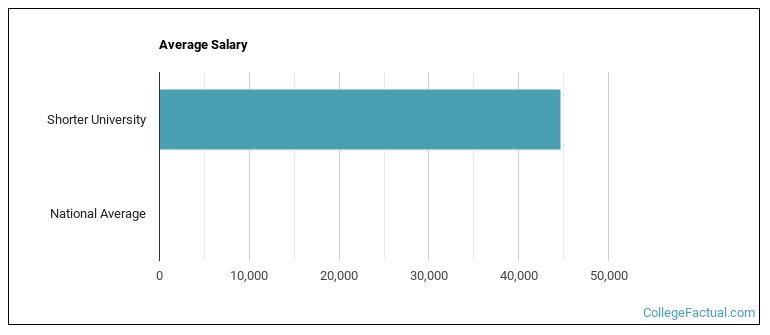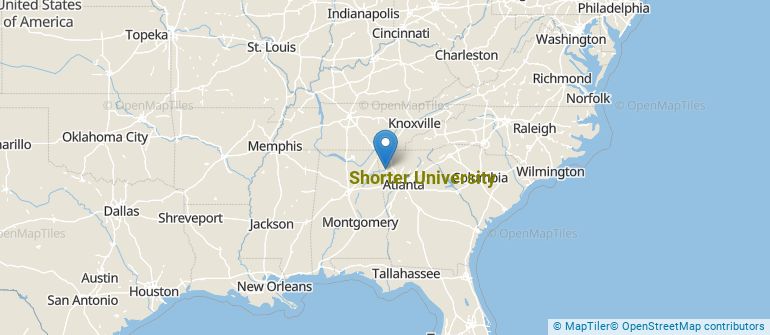 by our College Data Analytics Team
by our College Data Analytics TeamExplore the best ranked schools for the programs you are most interested in.
Shorter is ranked #1,994 out of 2,152 schools in the nation for overall quality on College Factual's 2025 Best Colleges list.
Out of the 68 colleges in Georgia, Shorter is ranked at #60.
With an acceptance rate of 97%, Shorter has a fairly liberal admissions policy. However, don't just assume you'll get in! Put together a good application and make sure you include all requested documents and materials.
About 15% of students accepted to Shorter submitted their SAT scores. When looking at the 25th through the 75th percentile, SAT Evidence-Based Reading and Writing scores ranged between 480 and 690. Math scores were between 480 and 600.
With a student to faculty ratio of 15 to 1, Shorter University is about average in this regard as the nationwide rate is 15 to 1. While this does not translate directly to class size, it's a good indicator of how much time professors will have to spend with their students on a one-on-one basis.
When estimating how much access students will have to their teachers, some people like to look at what percentage of faculty members are full time. This is because part-time teachers may not have as much time to spend on campus as their full-time counterparts.
The full-time faculty percentage at Shorter University is 58%. This is higher than the national average of 47%.
The freshmen retention rate tells us what percentage of first-year, full-time students choose to continue on to their sophomore year at a particular school. The rate at Shorter University is 72%, which is about average when compared to the national rate of 68%.
When it comes to finishing their studies on time, those seeking a bachelor's degree from Shorter have a four-year graduation rate of 33%. This is comparable to the national average of 33.3%
Find out more about the retention and graduation rates at Shorter University.
During the 2017-2018 academic year, there were 1,306 undergraduates at Shorter with 1,077 being full-time and 229 being part-time.
| $0-30 K | $30K-48K | $48-75 | $75-110K | $110K + |
|---|---|---|---|---|
| $14,860 | $11,953 | $15,048 | $16,660 | $18,503 |
The net price is calculated by adding tuition, room, board and other costs and subtracting financial aid.Note that the net price is typically less than the published for a school. For more information on the sticker price of Shorter, see our tuition and fees and room and board pages.
While almost two-thirds of students nationwide take out loans to pay for college, the percentage may be quite different for the school you plan on attending. At Shorter, approximately 60% of students took out student loans averaging $6,055 a year. That adds up to $24,220 over four years for those students.

Get more details about the location of Shorter University.

Contact details for Shorter are given below.
| Contact Details | |
|---|---|
| Address: | 315 Shorter Ave, Rome, GA 30165 |
| Phone: | 706-291-2121 |
| Website: | https://www.shorter.edu/ |
| Most Popular Majors | Bachelor’s Degrees | Average Salary of Graduates |
|---|---|---|
| Business Administration & Management | 113 | $47,140 |
| Teacher Education Grade Specific | 41 | $39,460 |
| Interdisciplinary Studies | 24 | NA |
| Liberal Arts General Studies | 21 | NA |
| Health & Physical Education | 21 | $24,291 |
| Nursing | 19 | $69,009 |
| Human Services | 15 | $30,167 |
| Accounting | 14 | NA |
| General Biology | 11 | NA |
| Teacher Education Subject Specific | 11 | NA |
Online courses area a great option for busy, working students as well as for those who have scheduling conflicts and want to study on their own time. As time goes by, expect to see more and more online learning options become available.
In 2022-2023, 665 students took at least one online class at Shorter University. This is an increase from the 651 students who took online classes the previous year.
| Year | Took at Least One Online Class | Took All Classes Online |
|---|---|---|
| 2022-2023 | 665 | 423 |
| 2021-2022 | 651 | 388 |
| 2020-2021 | 613 | 382 |
| 2018-2019 | 545 | 420 |
If you’re considering Shorter University, here are some more schools you may be interested in knowing more about.
Curious on how these schools stack up against Shorter? Pit them head to head with College Combat, our free interactive tool that lets you compare college on the features that matter most to you!
Footnotes
*The racial-ethnic minorities count is calculated by taking the total number of students and subtracting white students, international students, and students whose race/ethnicity was unknown. This number is then divided by the total number of students at the school to obtain the racial-ethnic minorities percentage.
References
More about our data sources and methodologies.